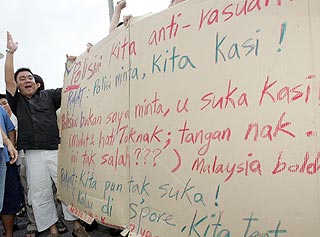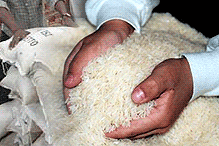The Pakatan Rakyat (PR) state governments and elected representatives must work with the Federal government and the police force to ensure that adequate personnel are deployed to crime-prone areas.
 PR governments could supplement measures to deter criminals by installing adequate lighting and CCTVs, while developers should be encouraged to build police beat-bases in new townships.
PR governments could supplement measures to deter criminals by installing adequate lighting and CCTVs, while developers should be encouraged to build police beat-bases in new townships.
Regular dialogues could be held between the police and residents, alongside promotion of community living and maintenance of related infrastructure.
While gated/guarded communities are a good idea, these should not prevent access to public roads and amenities. Standard rules must be introduced and illegally-built security posts should be demolished.
Apart from bringing down the crime rate, the PR governments also need to review implementation of the New Economic Policy (NEP) as this has caused much discontent among Malaysians.
Officially, the NEP ended in 1990 and was replaced by the National Development Policy. In turn, this was replaced in 2000 by the National Vision Policy - but for all intents and purposes, it remains another name for NEP.
The PR governments now have the opportunity to make a difference by implementing the true sprit of the NEP. As Malays form the largest segment of the disadvantaged, more help must be channelled to the community, but only to those who are really in need. Equally important is that the right kind of help is given.
Numerous reports suggest that padi farmers, smallholders and fishermen are among many Malays still living in poverty. The 2006 Annual Report of Padiberas Nasional Bhd (Bernas), the custodian of the padi and rice industry, reveals that its profit-before-tax (PBT) increased from RM54.3 million in 2002 to RM178.2 million - by 328 percent or 65.6 percent year-on-year (although Bernas did record a loss of RM7.6 million in 2003).
 If Bernas is making so much money, then why are padi farmers so poor? Is it because Bernas does not pay the farmers a fair price for their harvest or perhaps the yields are not good enough? This is something that the PR state governments must investigate and address. If Bernas is not paying a fair price, then it should be compelled to do so.
If Bernas is making so much money, then why are padi farmers so poor? Is it because Bernas does not pay the farmers a fair price for their harvest or perhaps the yields are not good enough? This is something that the PR state governments must investigate and address. If Bernas is not paying a fair price, then it should be compelled to do so.
Failing this, the PR state governments should allow step in and allow the farmers to sell on the open market. The farmers should also be provided with higher-yielding seeds, better fertilisers and equipment, credit facilities, and growth of cash crops to supplement income.
As for poor non-Malays, the PR must ensure that all Malaysians receive the right help. Indian and Chinese Malaysians need education, financial aid, training and affordable housing. It is an uphill task, but they can start immediately so that the results can be seen by the next general election.
Creeping Islamisation
Many of my non-Muslim friends in Kelantan sing praises about how open and modern the state is, although most of us are unable to experience this for ourselves.
It will never be disputed that Islam is the official religion of Malaysia. However, due to interpretation of Islam by those not qualified to do so, the position of Islam as a fair religion has been tarnished.
All these incidents happened outside Kelantan:
• Ban on the use of ‘Allah’ by non-Muslims
• Seizing of bibles
• Body snatching in conversion cases
• Cases involving Syariah and civil law
As all matters concerning land and religion are within the purview of the state, the PR governments have the opportunity to show Malaysians a more accurate picture of Islam - based on the principles of fairness and justice. Disputes involving civil and Syariah law must be resolved in a way that justice is dispensed to all parties involved.
 In my opinion, an Islamic country means that the majority of the population are Muslims, as in Indonesia. An Islamic state is one where the rules are based on Syariah law (as in Saudi Arabia).
In my opinion, an Islamic country means that the majority of the population are Muslims, as in Indonesia. An Islamic state is one where the rules are based on Syariah law (as in Saudi Arabia).
Based on this simple definition, Malaysia is an Islamic country. Even with the parallel Syariah law system in place, it is not an Islamic state. This dual system has served Malaysia quite well but fine-tuning is required.
The PAS-led Kelantan government has allowed non-Muslims to practise their religion and culture and has even provided financial support for places of worship. This is why my non-Muslim friends in Kelantan have always voted for PAS.
The issue of an Islamic state is highly sensitive and can be easily twisted to the disadvantage of PR Malaysians who voted for PR parties will certainly want the status quo to be preserved.
DEREK LAW is a chartered accountant and retired banker. His ultimate dream is for politics in Malaysia to rise above religion and race.

